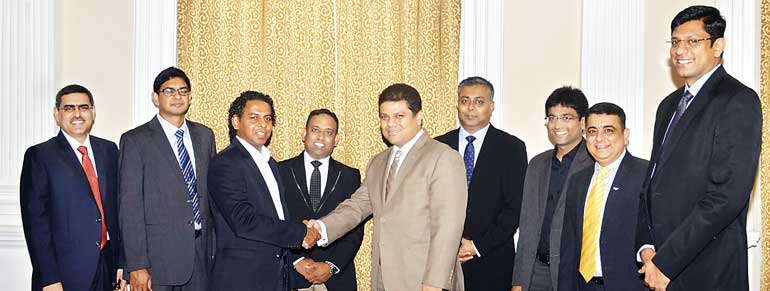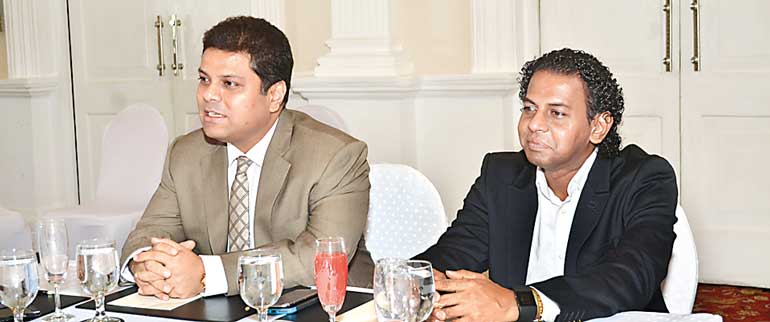Wednesday Feb 18, 2026
Wednesday Feb 18, 2026
Monday, 25 July 2016 00:00 - - {{hitsCtrl.values.hits}}


SAP Indian Subcontinent President and Managing Director Deb Deep Sengupta and SLSUG Chairperson Ramesh Shanmuganathan
By Hiyal Biyagamage
Global enterprise software giant SAP SE officially launched the Sri Lank SAP User Group (SLSUG) at a media briefing held in Colombo last week. The not-for-profit, independent industry association comes with a mission to empower Sri Lankan SAP community with the necessary resources and tools to maximise return on their SAP investments.
The media roundtable was addressed by SAP Indian Subcontinent President and Managing Director Deb Deep Sengupta and John Keels Holdings PLC Group Chief Information Officer and SLSUG Chairperson Ramesh Shanmuganathan. Speaking to journalists, Sengupta said SAP is fully-committed to enable Sri Lankan businesses to run live with innovative SAP solutions in the age of digital transformation.
“SAP has been active in Sri Lanka since 1999 and we consider the country to be one of the priority markets in the region. Even in troubled times, Sri Lanka showed great resistance by overcoming many economic challenges and maintaining a consistent GDP growth digit. SAP’s growth in Sri Lanka has been pretty much accelerative and with new infrastructure developments coming up along with fresh economic and social policies; SAP is confident that the momentum will be unbalanced,” Sengupta said.
A platform to lobby digital transformation
Presently, SAP SE has more than 100 customers in Sri Lanka, with number of industry-changing solutions being implemented across several business sectors. Sengupta mentioned that the timing was perfect in introducing SLSUG with number of SAP clients growing in Sri Lanka.
“By supporting the establishment of the SLSUG, we are aiming to provide a platform for customers to effectively engage with each other as well as with SAP, and enhance overall value realisation. The user group will not only facilitate networking among its members but help skill-building of local resources and advise public policy making bodies in terms of how technology can be adopted.”
Speaking at the briefing, Ramesh Shanmuganathan said that all the board members will play a key role in transforming the user group into a platform to lobby for certain key elements that will support country’s digital economy movement.
“We believe the formation of SLSUG has provided us a great platform to lobby for certain things. In a country of our nature, electronic invoicing is still not accepted whereas Singapore is going ahead with a 100% open data policy. The Right to Information Act was passed in the parliament couple of weeks’ back but the next step would be adopting an open data strategy and also to ensure that local consumers benefit from electronic invoicing and electronic transaction processing. I believe a platform like PayPal populates a huge interest for Sri Lankan companies to solidify our presence in the digital world. Today, credit card penetration is well passed one million users. With one million cards, you need to ensure that certain payment processing elements are implemented.”
“While helping our customers to get the best out of SAP; we are looking forward build a conversation through SLSUG to develop Sri Lanka’s digital ecosystem and use it as a benchmark against other countries to analyse what they are doing to build their digital economic developments,” said Shanmuganathan.
He also believes that the launch of SLSUG is an endorsement and a confidence-building exercise for Sri Lankan companies.
“The talk about a digital eco system and a digital world is huge and Sri Lanka has a mandate to turn things around with its economy by being a knowledge as well as a financial hub. The time has really come to up our game with digital technologies. Business models are getting disrupted by companies like Uber and Airbnb. Companies like our nature have got into different sectors because we have to compete globally. With a global player like SAP, our eco system will surely expand with the help of their solutions and have much more bandwidth in terms of reach and scale.”
“Now, we have our very own user group to represent the voice of local SAP customers,” added Shanmuganathan.
SAP surpasses
$ 20 billion goal
At the 2010 SAP TechEd held in Bangalore, Sengupta said the board appointed back in 2010 set a revenue target $ 20 billion by the end of 2016. When asked how close the company has come to achieve that, Sengupta said the target was well-achieved by the end of 2015.
“We reached $ 20 billion by 2015 and our market capitalisation has grown three times while doubling our employee strength. Our revenue mix across 165 countries has shown significant growth,” said Sengupta.
SAP’s 2015 financial statistics showed that company’s Q4 and full fiscal year revenue growth increased due to strong cloud sales. However, this backlashed on their profits where SAP suffered a decline, both for quarter and the full year.
Their fourth quarter revenue of €6.3 billion ($ 6.9 billion) was up 16% from €5.4 ($ 5.9 billion) billion during the same period in 2014. Operating profit fell 3% from the same period a year ago to €1.699 billion from €1.753 billion. For 2015, SAP reported total revenue of €20.8 billion (23 billion), up 18% from €17.6 billion ($ 19.4 billion). Cloud led that growth with a 110% increase in cloud services and support year over year to nearly €2.3 billion in 2015.
However, Sengupta said that SAP will look at further growing their business by improving three business areas: business apps, platforms (which includes HANA) and business networking tools. He also said the company now expects full year cloud and software revenue to increase by 6% to 8% in constant currencies in 2016, up from €17.23 billion ($ 19.04 billion) in 2015.
New avenues with the
new government?
Back in 2013, Sengupta revealed that they would extensively join hands with the then Sri Lankan government in developing ‘nation building initiatives’ such as constructing airports, ports and other utility infrastructures. Daily FT asked whether SAP has been able to open up new opportunities with the new government. Sengupta said that SAP will closely work with the government on urbanisation, fiscal policy management and infrastructure development. “Our goal is to enhance the overall SAP product experience for every Sri Lankan customer including the public sector. We are very excited about the prospects and it would be a tremendous opportunity to share experiences, knowledge, ideas and best practices in these projects,” said Sengupta.
An SAP User Group provides information, access and advocacy for SAP customers and professionals. Made up of SAP customers and partners, it is dedicated to educating members, facilitating customer involvement, and influencing SAP’s products and strategy. While closely collaborating with SAP, the SAP User Groups represent the opinions and interests of local businesses and help SAP to move a step closer to truly understanding the needs and requirements of customers. User groups bring two main advantages: exchange of knowledge as well as experience and exertion of influence.
The Board Members of SLSUG, which include industry leaders from eminent Sri Lankan businesses, are as follows:
SAP has User Groups worldwide operating as independent bodies. They include ASUG (Americas’ SAP User Group), INDUS (India User Group of SAP), SAUG (SAP Australian User Group) and DSAG (German – Speaking SAP User Group).